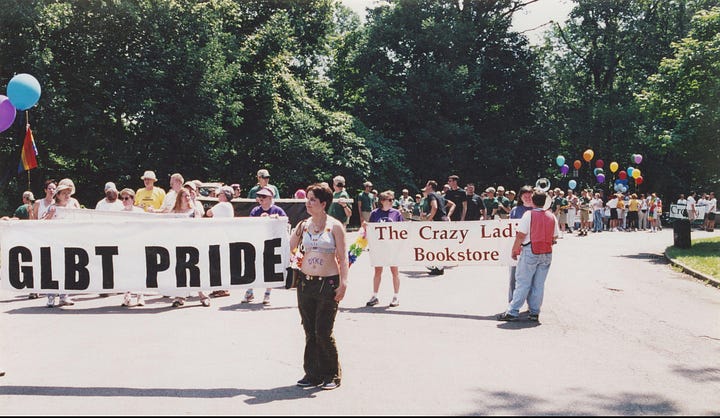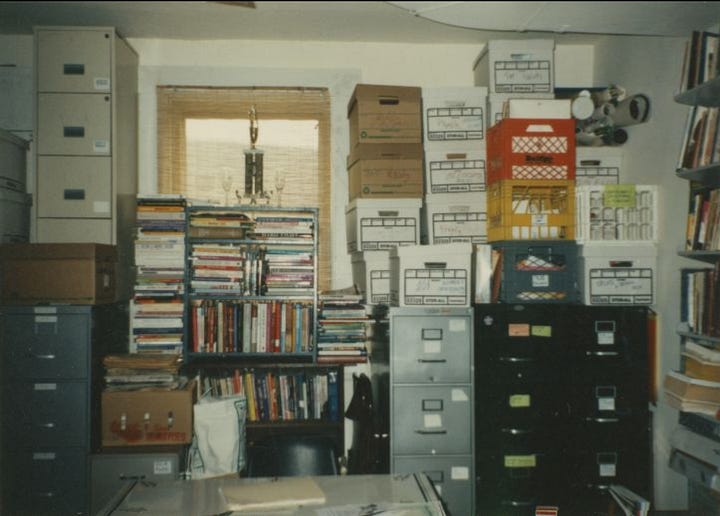By Phebe (Karen) Beiser, Co-founder of the Ohio Lesbian Archives
Imagine there are no cellphones and little internet. Now imagine there is little media attention about your life, or if there is, it is negative. Most churches consider you a sin. Most politicians won’t fight for you.
Because Victoria (“Vic”) Ramstetter and I realized we were lesbians as teenagers, and because we intuitively knew there were few people we could trust with this information about our lives—all this served to make us determined to never be invisible again. This was the impetus for our saving fliers, magazines, and small press books which became the beginning of The Ohio Lesbian Archives. This included the local lesbian magazine dinah, with its calendar of events, book reviews, and news. It became one of our most important sources for proving the existence of the lesbian and bisexual community. OLA was the only place collecting and preserving Greater Cincinnati LGBTQ history.
The Archives’ first public location was on the third floor of the Crazy Ladies Bookstore, on Hamilton Avenue in Northside. This was the community-owned location, although the previous rented one began in 1979 as a part-time job for librarian Carolyn Dellenbach. This was in 1989, and Crazy Ladies served the feminist, queer, and social justice communities. This location lasted until 2002.
More than a bookstore, Crazy Ladies served our community with its meeting room on the second floor for support and activist groups, and its bulletin board for finding an LGBTQ friendly apartment. It also served as a venue for buying tickets to “women’s music,” and a place for lesbian and feminist authors like Adrienne Rich and May Sarton to sell their books and meet their fans.
Crazy Ladies was the reason my partner Janice and I bought a house together in Northside. This was 1990 and the guy we bought our grandiose 1906 house from promised we’d feel right at home in “Dykeside.” Before the city’s Pride parade grew so huge it had to move downtown, it began as a neighborhood party, ending at Hoffner Park, located between Crazy Ladies and the Gay Community Center.


Amazon and the internet changed a lot of things. It meant you didn’t have to travel to Northside to buy LGBTQ books, or get in your car to visit the New Age bookstore. In fact it meant the death of many independent bookstores, including Crazy Ladies in 2002. CityBeat interviewed me about our needing a new home. A guy from the Clifton United Methodist Church called and said his boyfriend was the choir director, and there was an empty room next to their practice room. It was a basement, but clean and not moldy. Would the Archives be interested? We were, since it was our only offer.
What began as a place of relief turned into a thriving little library next to the University of Cincinnati. Convenient to students and researchers. The church was a welcoming congregation with social justice as a priority. Every June, during Pride Month, the Archives would be discovered by local media, which increased our visibility. Soon our small room became crowded. We had treasures in boxes behind the file cabinets that we forgot about, and had no way to display. It was clear we had to move again.
By then a steady Board of Trustees helped our 501©(3) nonprofit grow. Scott Knox, a gay attorney, joined the Board, and Scott and I became the committee to search for new space. Michael Chanak had been saving trust fund money from the defunct All Saints Church. He believed that the Archives served as a genuine community center, and that our longevity—now over 30 years—proved trustworthy. Finally, John Bell of MCC Church generously donated money, when the congregation was dying off and their building was sold.
We found the eCenter, a shared historic building housing small organizations and businesses. Located in the Over the Rhine section of downtown with brick buildings built by German immigrants from 1865-1880s, the architecture was heavily Italianate and Queen Anne. Our new home was adjacent to Washington Park, with the majestic Music Hall on the other side. A very cool—yet expensive—place (especially after our paltry rent for the church basement).
In September 2025 as this article is written, we are halfway through our five-year lease. Our vice president is writing grants, and the Archives has received a tentative OK to fund our first paid position, who will work on development and help us strategize our future.
Meanwhile, the Ohio Lesbian Archives continues to attract volunteers, who become excited when they enter a room filled with 3,400 books, file cabinets with regional (and some national) historic newspapers and magazines, 500 political buttons from marches and music festivals, and—last but not least-- “Jill’s Journals,” twenty years of a lesbian’s diaries sharing her dreams and sorrows. This primary resource captivates anyone who opens to any random page, reminding us that saving the stories of “unknown” lesbians is essential.




Here's to another 30 years and more. Keep up the great work!